Original Title: "The Story of Fat Penguin CEO Luca Netz"
Written by: Thejaswini M A
Translated by: Block unicorn
Preface
The boxes at the Ring distribution center don’t pack themselves, but 16-year-old Luca Netz is always distracted. Around him, colleagues efficiently complete their shifts. But Netz is focused on how to turn a startup into a billion-dollar acquisition company.
He dropped out of school for this warehouse job, spending most of his childhood sleeping wherever his mother could find. Now, he is witnessing firsthand how a company truly creates wealth.
This experience taught him how startups scale, how they consume capital, and how they struggle to survive to reach escape velocity.
Years later, when Netz bet $2.5 million on a group of cartoon penguins that most people deemed worthless, this lesson proved invaluable. Today, these penguins sit on the shelves of Walmart, and the once-homeless Los Angeles boy has become one of the most influential builders in the cryptocurrency space, with a net worth exceeding $100 million at just 25.
"We were homeless for about ten years," Netz recalls calmly. "We lived all over the world, from South Africa to Paris, London, New York, and then Los Angeles. We lived like this as long as my mom could muster the courage."
The Growth of a Con Artist
Netz's mother, an undocumented immigrant from France, spoke little English and struggled to find stable work. They moved constantly, living with friends, acquaintances, and sometimes even strangers willing to take them in temporarily. For young Luca, home was wherever they happened to sleep that week.
Most would see such a childhood as a hindrance. Netz learned to view it as an education. The constant displacement taught him adaptability. Uncertainty trained him to spot opportunities that others overlooked. Hunger taught him to act quickly when opportunities arose.
By high school, Netz discovered a simple truth: his classmates were willing to pay more for convenience rather than walk to Burger King. So, he began buying chicken sandwiches and snacks, then reselling them at a markup from his backpack. Simple math, but very effective.
When Netz was twelve, his family finally settled in central Los Angeles. There, he tasted the feeling of stability for the first time. The constant moving stopped, at least for a few years.
At sixteen, Netz dropped out of high school, printed a hundred resumes, and then walked the tech streets of Santa Monica, visiting every startup he could find, as if campaigning for a job.
Ring hired him. It was 2015, and the smart doorbell company had only twenty employees and grand dreams. Netz started in the warehouse—packing boxes, processing orders—a job most people wouldn’t think much about. But he was focused on things far beyond that: funding rounds, hiring frenzies, and how problems were solved (or not).
He witnessed Ring grow from an unremarkable startup to a billion-dollar acquisition target for Amazon. While he packed boxes, venture capital poured in. While he processed orders, the company scaled. He received an education in startup mechanics that a typical mainstream MBA program could not provide.
"I was able to witness a company go from raising millions to becoming a billion-dollar company," Netz recalls.
The Gold Chain Epiphany
While working at Ring, 16-year-old Netz began to notice a strange phenomenon in hip-hop culture. Rappers would spend tens of thousands or even hundreds of thousands of dollars on gold chains and diamond jewelry. But upon closer observation, he found that most fans couldn’t distinguish between a $100,000 gold chain and a $200 gold-plated replica.
This observation became the foundation of his first real business. Netz found suppliers for gold-plated chains and cubic zirconia diamonds that looked almost identical to the expensive versions. He then devised a simple yet clever marketing strategy: he would pay $50 to $100 to popular rappers' fan pages to promote his jewelry.
"Every time I paid them, they posted my promotion, and we made back $1,000 to $2,000 or even $5,000 each time," he recalls. The return on investment was so high that he could immediately reinvest profits and expand aggressively.
Nine months after launching a dropshipping business on Shopify, Netz achieved his first million-dollar revenue. He was 18 at the time. Eventually, he sold the jewelry business for $8 million, providing him with the capital to pursue bigger goals.
With money in the bank, Netz began to diversify, leveraging the social media marketing experience he gained from the jewelry business. He became the Chief Marketing Officer of the iconic clothing brand Von Dutch, gaining experience managing established brands.
He then became the Chief Marketing Officer and major investor of Gel Blaster, a toy company that produces Orbeez-based toy guns. Under his marketing leadership, Gel Blaster achieved significant market success, being dubbed "the fastest-growing toy company in North America" by industry publications.
But the universe had something cuter in store for him.
Penguin Rescue
In early 2022, the NFT market was still riding high from the previous year's explosion. Digital artworks were selling for millions, celebrities were changing their avatars to cartoon apes, and new projects were launching daily, promising to create the next Disney.
One of these was Pudgy Penguins, a series of 8,888 cartoon penguin NFTs that attracted attention for its cute designs and strong community. But by January 2022, the project was in crisis. The initial founders had overpromised and underdelivered, and the roadmap projects were unfulfilled. There were allegations of mismanagement, and community trust collapsed.
On January 6, 2022, the community voted to oust the initial founders. On the same day, Netz publicly offered on Twitter to buy the entire Pudgy Penguins collection and its intellectual property for 750 ETH (about $2.5 million at the time).
This was not an easy decision. The acquisition occurred just a week before the NFT market entered a two-year bear market. Netz and his executive team raised funds for the acquisition and worked without pay for a year while reinvesting $500,000 of their own money to keep the project alive.
What attracted him was the potential to build a lasting brand. "If I couldn't imagine Pudgy Penguins becoming a billion-dollar brand with my eyes closed, I would never have bought it," he said.
Beyond Digital Collectibles
Most people assumed Netz would flip Pudgy Penguins, clean up the mess, pump up the floor price, and then sell to the next buyer. However, he completely ignored the NFT market.
Under the leadership of Igloo Inc., Pudgy Penguins became an unprecedented brand: a crypto brand operating in the real world. Netz established six revenue streams: digital experiences, physical products, licensing deals, content creation, film development, and gaming. These penguins were no longer just avatars but characters in a larger story.
The strategy for physical products initially seemed crazy. Would cryptocurrency enthusiasts buy plush cartoon penguins? But Netz's target was not cryptocurrency enthusiasts; it was parents shopping at Walmart.
Each plush toy came with a QR code that directed buyers to "Pudgy World," a digital space where users could obtain a crypto wallet and claim NFT wearables.
Pudgy World is a free 3D browser game where players can customize their penguin avatars, explore a virtual world using their NFTs and physical toys, seamlessly integrating Web 3 ownership with easy-to-play gaming. Parents thought they were buying a plush toy for their kids, but in reality, they were unknowingly entering Web 3.
The success of this strategy surprised everyone. Pudgy Penguins toys are now on the shelves of Walmart, Target, Chuck E. Cheese, Amazon, and Walgreens. Over 1.5 million toys have been sold, generating over $10 million in revenue within a year.
While other NFT projects collapsed or desperately pivoted, Pudgy Penguins quietly became a crypto brand that could survive without relying on cryptocurrency.
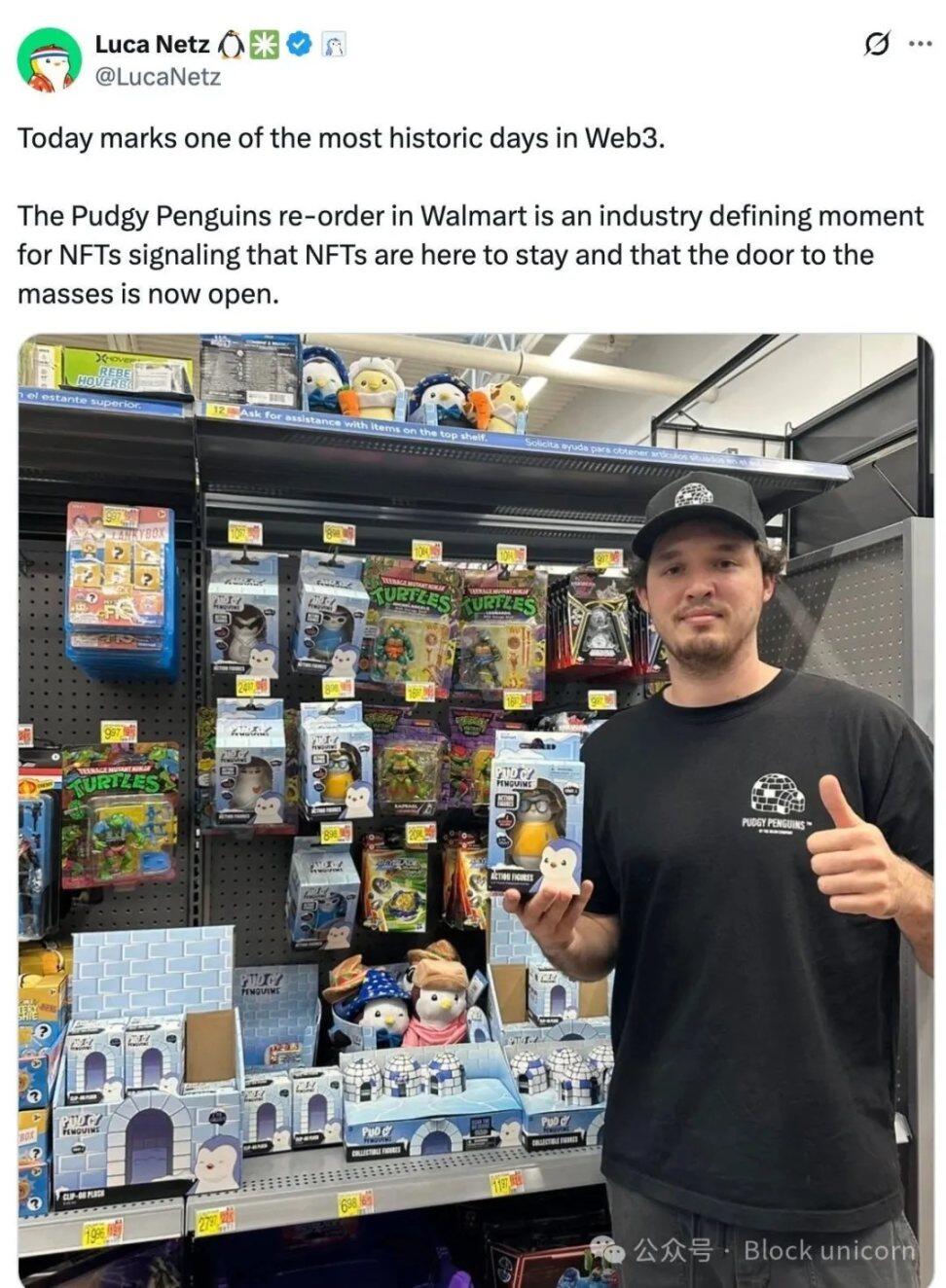
Token Issuance
On December 13, 2024, Netz airdropped $1.5 billion worth of PENGU tokens to millions of user wallets in the crypto ecosystem. This was the largest airdrop in Solana's history. He chose Solana for its lower transaction fees and higher throughput to maximize accessibility.
25.9% of the tokens were allocated to the Pudgy Penguin community, 24.12% to other communities and newcomers, with the remainder distributed among team members (with a lock-up period), liquidity provision, and company reserves.
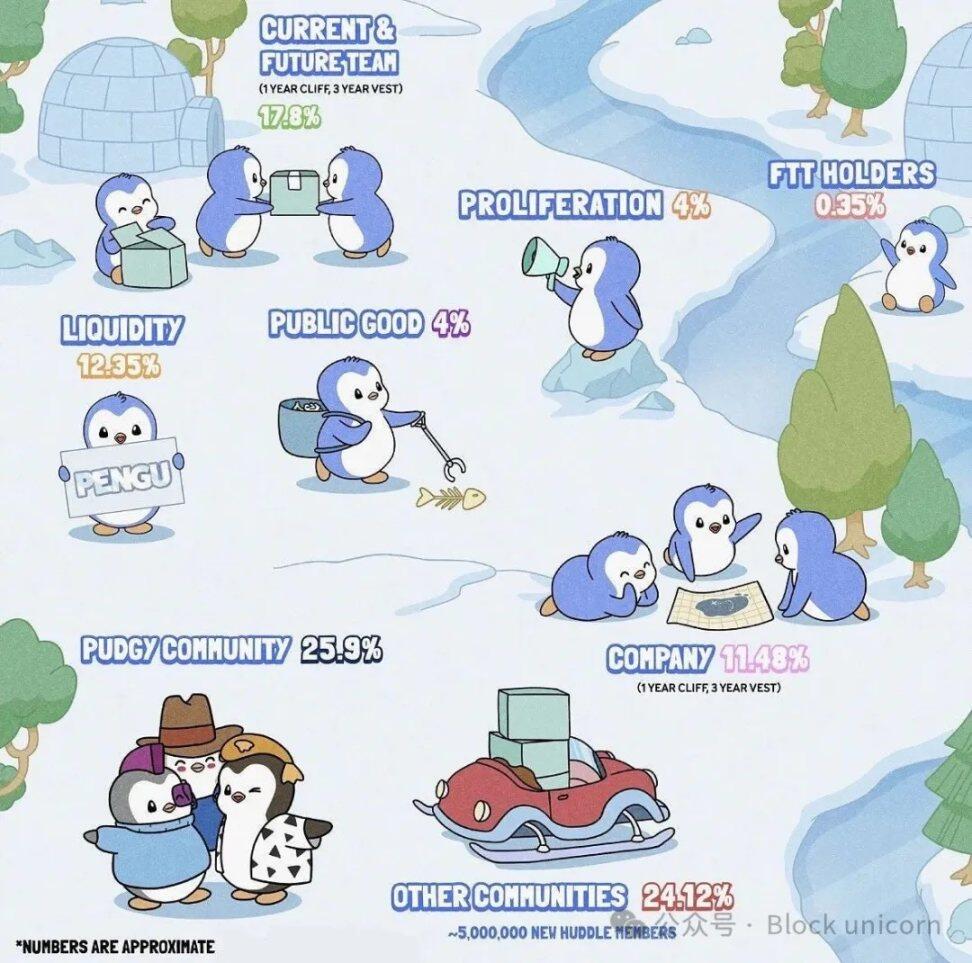
The issuance sparked intense debate in the crypto community. Some praised the broad distribution as democratizing the project's success. Others criticized distributing tokens to millions of wallets instead of concentrating rewards for long-term holders.
Netz defended this strategy: "I don't want to issue a $2 billion token and then stop there forever. I'm chasing real giants. I'm chasing Dogecoin." He believes that for PENGU to reach the scale of a mature meme coin like Dogecoin, it needs a release story that resonates with mainstream audiences.
Since its launch, PENGU's performance has validated some of Netz's bold predictions. When PENGU debuted, it had a market cap of about $2.3 billion, then experienced the typical volatility of a large token issuance, initially dropping significantly before finding support. The token consolidated between key price levels for months, laying the groundwork for a subsequent major rebound.
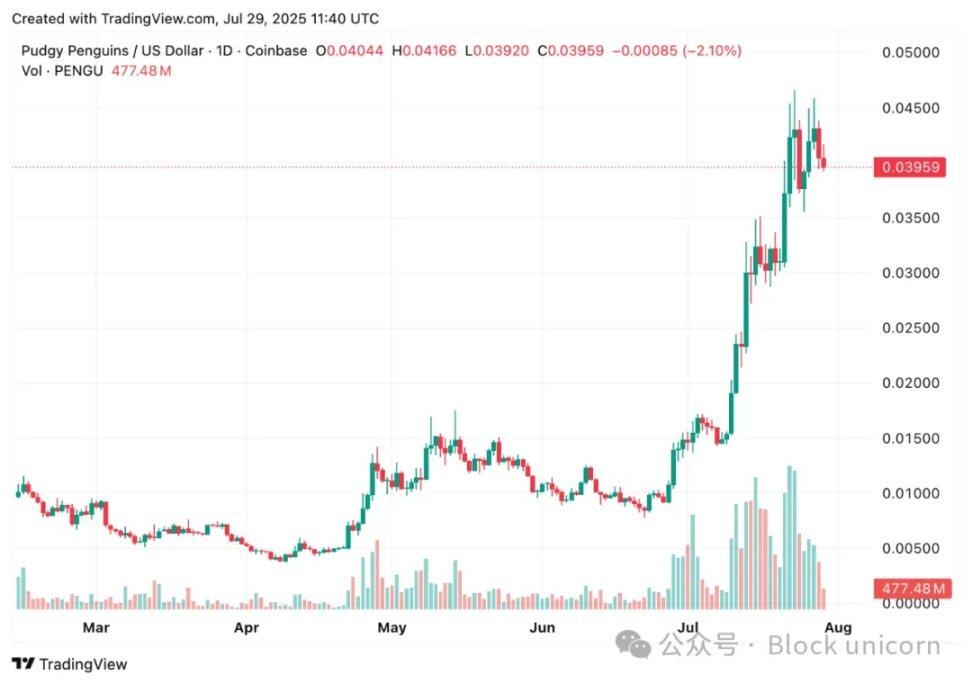
By mid-2025, as large holders accumulated and daily trading volume surpassed $2.5 billion, PENGU skyrocketed over 300% in just a few weeks, with its market cap exceeding $2.5 billion.
This surge was driven by multiple catalysts, showcasing the ecosystem's growing mainstream appeal. The most significant driver was Canary Capital's groundbreaking PENGU/NFT-themed ETF application submitted to the SEC. This institutional validation triggered massive FOMO in the market, indicating that traditional finance was beginning to pay attention to the Pudgy Penguins ecosystem. The accumulation by large holders provided the technical foundation for the rise, with over 200 million PENGU tokens acquired by large holders since July, reflecting strong interest from both institutional and retail investors.
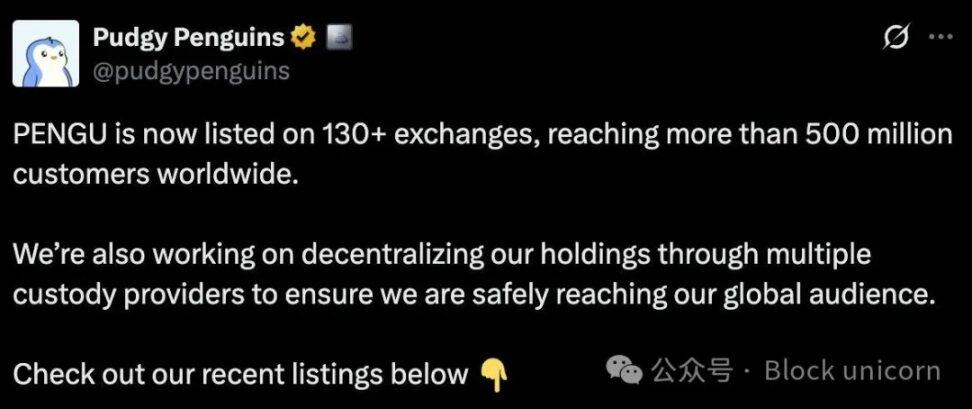
Strategic partnerships with mainstream brands, including NASCAR, Lufthansa, and Suplay Inc., have brought unprecedented exposure beyond the crypto circle. Ongoing rumors about Pudgy Penguins potentially acquiring OpenSea further fueled speculation, although the team later denied these rumors.
Meanwhile, the original NFT series has maintained strong performance, with the floor price stabilizing at 15-16 ETH, significantly recovering from bear market lows, validating Netz's strategy of creating lasting value beyond short-term hype.
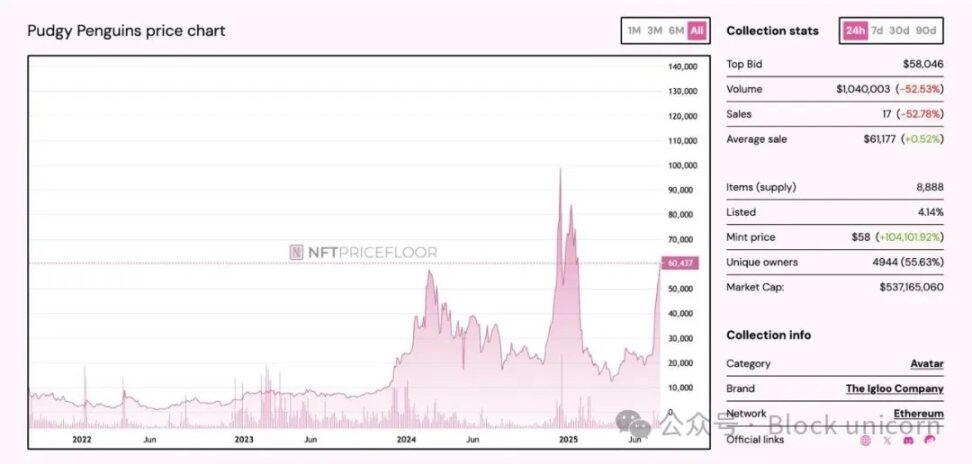
Building a Consumer Blockchain
In January 2025, Abstract launched as Netz's boldest bet to date: a blockchain that doesn’t feel like a blockchain. No wallet setup. No mnemonic phrases to store. No gas fees to calculate. Users can start trading without even knowing they are using blockchain technology.
Netz believes that the blockchain itself is the least interesting part of Abstract. In his view, consumers won’t go on-chain unless they have a reason to, and unless friction disappears. Most importantly, he wants Abstract to be fun, allowing people to play games, collect digital items, and interact with applications without thinking about the underlying technology.
This vision attracted $11 million in investment from Founders Fund and other top investors. By the time Abstract launched, there were over 100 applications available, with more than 400 in development. These are not DeFi protocols or trading platforms, but games, music, sports, and fashion applications running on the blockchain.
This ambition reflects the person behind it. Netz works six days a week, 12 hours a day, from 8 AM to 8 PM, with no vacations. The only break is from 6 PM to 8 PM, which he calls "critical thinking time," used to process the day's affairs and plan for the next day's execution.
Abstract could become the platform that ultimately brings cryptocurrency to mainstream consumers. Or it could become another expensive lesson in the gap between vision and reality. For Netz, the discomfort of not knowing the outcome is precisely the point.
Vision for the Future
Netz has his own theory about the future. Traditional brands sell products to consumers, with transactions ending at the cash register. NFTs completely reverse this model. What you get is not customers, but participants; not buyers, but stakeholders who share in the success of the brand.
This mechanism creates unprecedented synergies. When Pudgy Penguin holders promote the brand, they automatically become investors protecting their own assets. When these toys hit the shelves at Walmart, every NFT holder is a winner. It’s a form of capitalism that involves all participants.
But Netz is not thinking about quarterly earnings. He is planning for decades. The full experience of Pudgy World, developed over 18 months, has already seen hundreds of thousands of accounts created and is about to launch. He plans to actively expand into the Asia-Pacific market, betting that the next wave of crypto enthusiasm will rise from the East.
25-year-old Luca Netz stands at the intersection of two worlds that shouldn’t collide. On one side is the chaotic speculative world of cryptocurrency, where wealth can evaporate in minutes; on the other is the slow-moving machine of traditional retail, where securing shelf space at Walmart requires months of negotiation and a reliable track record.
Most people would choose one side, but Netz has built a bridge.
He knows that the future is not about choosing between digital and physical, community and commerce, innovation and accessibility, but about proving they were never oppositional.
Every Pudgy Penguin toy sold at Target comes with a QR code that unlocks a digital world. Each PENGU token traded represents brand ownership that exists simultaneously in blockchain code and retail products. Every Abstract user who registers with just an email unwittingly enters the future of finance.
This is Netz's revolution. Making the impossible inevitable. He hasn’t disrupted the industry; he has taught them to communicate with each other.
In the brief history of cryptocurrency, most success stories follow a familiar arc: technological breakthroughs, venture capital, explosive growth, and ultimately decline. Netz has written a different script. He has turned the industry’s biggest weakness—its opacity to ordinary people—into his competitive advantage.
Some entrepreneurs create companies. Others create movements. Netz has created a new category of existence. A sense of digital ownership that feels as natural as holding a plush toy, with a global community forming around shared joy rather than common interests, and the most complex technology hidden behind the simplest experiences.
免责声明:本文章仅代表作者个人观点,不代表本平台的立场和观点。本文章仅供信息分享,不构成对任何人的任何投资建议。用户与作者之间的任何争议,与本平台无关。如网页中刊载的文章或图片涉及侵权,请提供相关的权利证明和身份证明发送邮件到support@aicoin.com,本平台相关工作人员将会进行核查。




